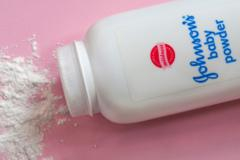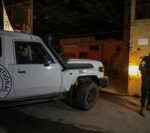Alamy
A major legal claim has been filed in the UK against pharmaceutical giant Johnson & Johnson, accusing the firm of knowingly selling baby powder contaminated with asbestos.
The claim involves 3,000 people and focuses on internal memos and scientific reports, which have been seen by the BBC.
The lawsuit – brought by KP Law against Johnson & Johnson (J&J) and its subsidiary Kenvue Ltd – alleges that J&J was aware as early as the 1960s that its mineral-based talcum powder contained fibrous forms of talc, as well as tremolite and actinolite. Both minerals – when in their fibrous form – are classified as asbestos and linked to potentially deadly cancers.
The court papers allege that, despite knowing the minerals were directly linked to cancers, J&J never issued warnings on the packaging of its baby powder. Instead it launched aggressive marketing campaigns portraying the powder as a symbol of purity and safety, the lawsuit claims.
J&J denies the allegation as well as any claims it knowingly sold baby powder contaminated with asbestos.
A statement from the company said its baby powder “was compliant with any required regulatory standards, did not contain asbestos, and does not cause cancer”.
The sale of baby powder containing talc stopped in the UK in 2023.
The UK action mirrors extensive litigation in the US, where multiple lawsuits have been filed and claimants – predominantly those with mesothelioma and ovarian cancer – have been awarded billions of dollars in damages. The company has successfully appealed in some cases.
Lawyers for the claimants estimate damages sought in the UK could extend to hundreds of millions of pounds and that the claim could become the largest product liability case in British history.
The claims of links between talcum powder and cancer revolve around asbestos – a known cause of cancer.
Talc, which was used in J&J talcum powders, is a naturally occurring mineral that is often mined in close proximity to deposits of asbestos. It is asbestos minerals in their fibrous needle-like form that are associated with cancer.
The claim alleges J&J had identified asbestos in its baby powder as early as the 1960s. One internal document from 1973 allegedly says: “Our baby powder contains talc fragments classifiable as fiber. Occasionally sub-trace quantities of tremolite or actinolite are identifiable…”
J&J referred the BBC to its co-defendant company Kenvue, which said this letter was discussing how regulation might change and thereby define talc fibres as asbestos. The firm said that would have been wrong.
‘Keep the whole thing confidential’
Documents cited in the UK lawsuit are also alleged to show that from the early 1970s J&J executives pushed US
Read More





